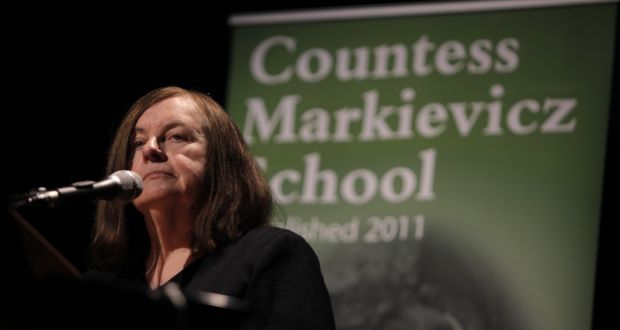Brexit campaign in North ‘played on racism and emotions’
Resource type: News
The Irish Times | [ View Original Source (opens in new window) ]
Immigrants in Dungannon are very concerned about what might change and when
by Gerry Moriarty in Dungannon

Lifelong republican and socialist Bernadette McAliskey was conflicted about how to vote in the EU referendum but in the end plumped for Remain.
She agreed with the left analysis of her friend Eamonn McCann that, in essence, there is little difference between British imperialism and European imperialism and so a plague on both their houses.
She went for Remain based on practical on-the-ground reasons: primarily what Leave might mean for the hundreds of immigrants she works with inDungannon.
The town is in a Fermanagh South Tyrone constituency that voted 28,200 to stay and 19,958 to quit the EU.
“I voted Remain notwithstanding all the things that I know about the European Union,” she said. “You have to make the decision in this context, in this time: does it bring us forward or back?”
She didn’t “really see how strengthening the Little Englander mentality with the whole imperialist history behind it and a racist agenda” would strengthen the left position. She wasn’t saying that “everybody in the Leave campaign or even the majority of them were racists . . . but every racist voted to Leave”.
Alarmed
Her view is coloured by the fact she is chief executive of Step (the South Tyrone Empowerment Programme) that has a special migrant workers’ support project that assists the 1,500 foreign nationals living and working in Dungannon, a town of 15,000. Most work in food processing.Brexit had alarmed them, said Ms McAliskey. “Our main work is in reassuring them that at present nothing is going to change in their entitlements.”
The workers mainly come from Lithuania, Poland and East Timor, the last-mentioned have Portuguese citizenship. Most have EU status.
There were some serious racist attacks in the past but the work of Step and others have helped to reduce such incidents in Dungannon. There is a degree of assimilation.
Polish father and son Jan (49) and Darek Drodzd (19) also had concerns about Brexit but, it must be said, they also focused on last night’s Poland v Portugalgame.
Residency
Jan, from Krakow, came to work in the meat processing industry 12 years ago and now, with Darek, owns and runs the Polish Delicatessen on Scotch Street. “We are not worried about Brexit – not yet,” said Jan.Down the line though he is concerned for the business he had built up over five years. The UK outside the EU probably would mean extra tariffs to import the Polish sausages and meat, fish, bread and other delicacies, he said. “That could threaten my business.”
Jan loves Dungannon and Northern Ireland and said the Poles and Northern Ireland supporters got on famously at the Euros during their game in Nice. He could not quite understand why the English and Welsh particularly wanted out of Europe: “This is not good for England. Good for Russia. Good for Putin. Not good for England. Not big Britain now, small Britain.”
Palestinian immigration lawyer Abed Natur, who is married to an Irish woman and based in Dungannon, said the referendum result was very disappointing.
“I think the Brexit campaign played on the emotions of people, it played on xenophobia and racism,” he said.
Mr Natur said that many who were based here for more than five years could have applied for British residency but because of their EU standing hadn’t felt the need to. His advice in this time of uncertainty is to apply now.
Step (the South Tyrone Empowerment Programme) is an Atlantic grantee.